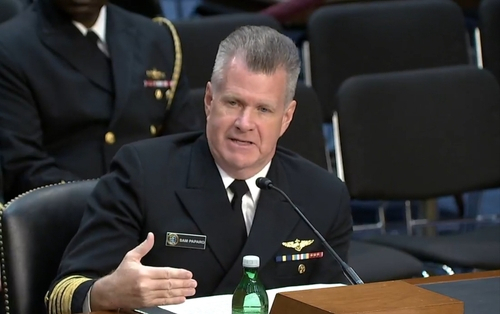 |
Adm. Samuel Paparo, the nominee for commander of U.S. Indo-Pacific Command, speaks during a confirmation hearing at the Senate Armed Services Committee in Washington in Feb. 1, 2024 in this photo captured from a livestream from the committee's website. (PHOTO NOT FOR SALE) (Yonhap) |
The nominee for US Indo-Pacific Command chief expressed deep concerns Thursday over the burgeoning military partnership between North Korea and Russia, portraying it as a "symbiotic" one that goes against the principles of global peace.
During a confirmation hearing of the Senate Armed Services Committee, Adm. Samuel Paparo, currently US Pacific Fleet commander, also noted that Russia might have given "potentially high-end" technology to the North in return for the North's arms supplies to Russia.
"It is concerning deeply. It is symbiotic," he said, referring to the bilateral partnership.
"It closes gaps each for the other, providing conventional weapons to Russia from North Korea ... providing sanctions evading materials and potentially high-end technology to North Korea," he added.
He went on to say, "In all cases, it runs counter to the principles of peace and stability in the Indo-Pacific and globally."
The White House has revealed that the North supplied Russia with several dozen ballistic missiles for use in Ukraine in addition to its earlier shipments of military equipment and munitions to Russia.
In return for the North's armed support, Pyongyang has been seeking military assistance from Russia, "including fighter aircraft, surface-to-air missiles, armored vehicles, ballistic missile production equipment or materials, and other advanced technologies," according to US officials.
Paparo touched on the "changing dynamic" of the Korean Peninsula where inter-Korean tensions have risen.
"The changing dynamic is continued saber-rattling, continued proliferation, a greater volume of testing and weapons demonstrations on the part of the North," he said.
"In response, South Korea has increased its intelligence, surveillance and reconnaissance activities in the vicinity of the North ... It continues to be tense."
Against the backdrop of evolving North Korean threats, the admiral highlighted the importance of extended deterrence, America's commitment to using the full range of its military capabilities, including nuclear, to defend its ally.
"Whatever the public statements (by North Korea), as a military commander, I must look at the capability development, and to be able to pace that, to deter that, extended deterrence, particularly with US strategic forces, is absolutely essential," he said.
In his written answers to the Senate's advance questions, Paparo said that there are "significant strategic and military risks" associated with a potential conflict on the Korean Peninsula -- a warning at a time of tensions heightened by the North's bellicose rhetoric and continued weapons tests.
He also noted that the US' airborne intelligence, surveillance, reconnaissance (ISR) allocation is "less than" what the US requires to support the "multifaceted problem-set" and to enhance deterrence by detection against the North Korean threats.
On the question of China's influence to address North Korean threats, Paparo voiced skepticism.
"The PRC has not fulfilled its international obligations regarding multiple U.N. Security Council Resolutions restricting the DPRK's nuclear and missile development and related activities," he said. DPRK and PRC stand for the official names of North Korea and China, the Democratic People's Republic of Korea and the People's Republic of China, respectively.
"Simply stated, I do not assess we should rely on the PRC to restrain the DPRK."
Casting the South Korea-US alliance as the linchpin of peace and security on the peninsula, he underscored the importance of the US facilitating an "increased" role for South Korea "commensurate with its economic status and influence in as many multilateral venues as possible."
The hearing also touched on the issue of North Korea's reported cryptocurrency theft that is thought to have helped the reclusive regime evade sanctions and continue to bankroll its weapons programs.
Asked if cutting off the North's access to cryptocurrency would strengthen global security, Paparo said, "Yes, directly."
"Cryptocurrency inherently with its opaqueness, is a key enabler worldwide for proliferation, for terror, for illicit trafficking, including illicit trafficking in drugs," he said.
He added, "People can make money outside the eyes of law, and it provides a moral hazard whereby people can do bad things without fear of punishment because it's opaque." (Yonhap)







